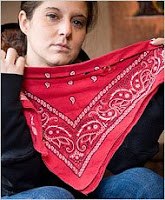 Yarg! Not again. Last week, it was Misha: A Mémoire of the Holocaust Years by Misha Defonseca. (Not!) Just when we were beginning to forget about James Frey, who single-handedly smashed the credibility of memoirists into A Million Little Pieces. Now there's this from Motoko Rich's article in the NY Times yesterday:
Yarg! Not again. Last week, it was Misha: A Mémoire of the Holocaust Years by Misha Defonseca. (Not!) Just when we were beginning to forget about James Frey, who single-handedly smashed the credibility of memoirists into A Million Little Pieces. Now there's this from Motoko Rich's article in the NY Times yesterday:In “Love and Consequences,” a critically acclaimed memoir published last week, Margaret B. Jones wrote about her life as a half-white, half-Native American girl growing up in South-Central Los Angeles as a foster child among gang-bangers, running drugs for the Bloods.
The problem is that none of it is true.
Margaret B. Jones is a pseudonym for Margaret Seltzer, who is all white and grew up in the well-to-do Sherman Oaks section of Los Angeles, in the San Fernando Valley, with her biological family. She graduated from the Campbell Hall School, a private Episcopal day school in the North Hollywood neighborhood. She has never lived with a foster family, nor did she run drugs for any gang members. Nor did she graduate from the University of Oregon, as she had claimed.
Riverhead Books, the unit of Penguin Group USA that published “Love and Consequences,” is recalling all copies of the book and has canceled Ms. Seltzer’s book tour, which was scheduled to start on Monday in Eugene, Ore., where she currently lives.
In a sometimes tearful, often contrite telephone interview from her home on Monday, Ms. Seltzer, 33, who is known as Peggy, admitted that the personal story she told in the book was entirely fabricated.
Ironically, just last week, a Times review of Seltzer's book gushed:
Although some of the scenes she has recreated from her youth (which are told in colorful, streetwise argot) can feel self-consciously novelistic at times, Ms. Jones has done an amazing job of conjuring up her old neighborhood...
Ms. Jones’s portraits of her family and friends are so sympathetic and unsentimental, so raw and tender and tough-minded that it’s clear to the reader that whatever detachment she learned as a child did not impair her capacity for caring. Instead it heightened her powers of observation, enabling her to write with a novelist’s eye for the psychological detail and an anthropologist’s eye for social rituals and routines.
Snarg. The next sound you hear: a memoirist's nostrils flaring. Come on. I saw that cheesey photo of her with the bandana and just wanted to smack somebody. When the news broke yesterday that the memoir was fake, I was not a jot surprised.
Since my own memoir was released in 2001, I've seen the legal reviews get tougher to the tenth power. I honestly can't fathom how something like this happens in the chicken-Freyed memoir market. Whose responsibility is it to see that the truth is told? How do we differentiate between lies and the adjustments to detail that have to be made in order to avoid lawsuits and condense the story into a readable form? Can the memoir market survive any more bad press? Or is the word "memoir" becoming synonymous with "bullshit"? I think it's time we in the industry start talking some serious talk about it. Please, baby Jesus, let me be invited to participate in a few panel discussions. I'm storing up the choice words.
3 comments:
It stinks knowing that honest memoirist and ghost-writers will be forced to pay the price, in terms of annoying and invasive double-checking, anal legal reviews, and increased suspicion among readers, for a few yahoos who can't tell the difference between a memoir and a novel. Or who feel the need to construct some larger-than-life respresentation of themselves and ride that Trojan horse to stardom.
I hate it when people in my genre make the rest of us look dumb, too, or lazy or dishonest. It's maddening to get lumped in with those who really are.
Ladies, all you can do is hang on to your integrity and demonstrate your principles by example. A lesson I had to learn in my previous profession.
She had her hog snollop about why she did it, but it's about the money. That book would have been a tough sell as a novel by some WASP chick. As a memoir by a tormented survivor, it had hook. If she'd truly intended to give voice to people she'd met in LA, she could have written about them -- a powerful and honest book that she was clearly capable of writing.
It's sad for her and everyone else involved that greed ruled the day.
Post a Comment